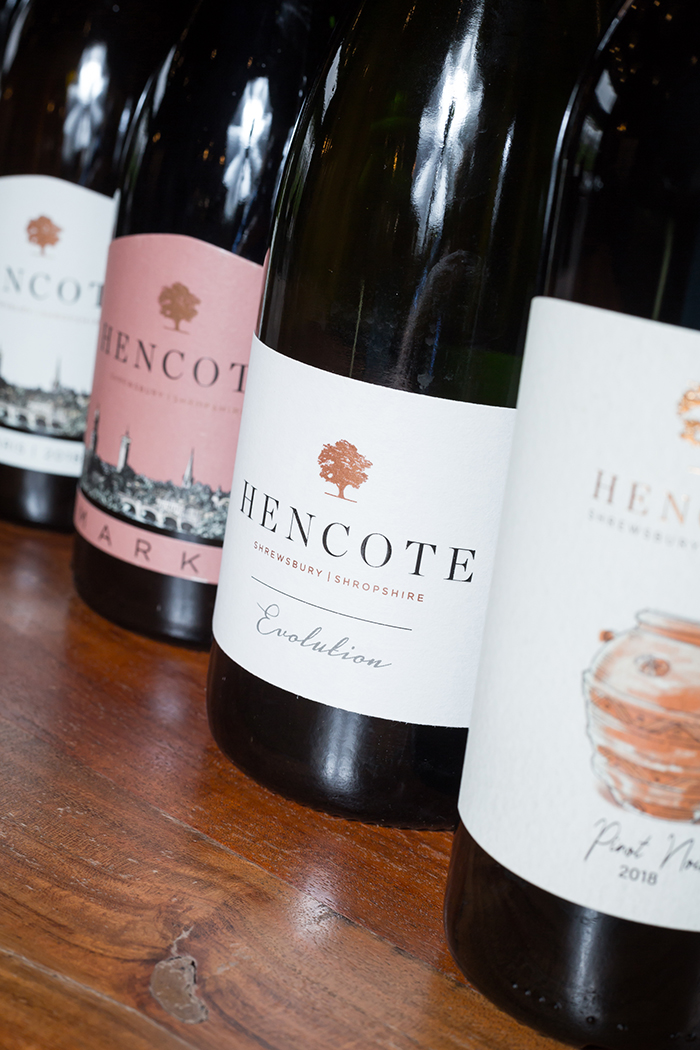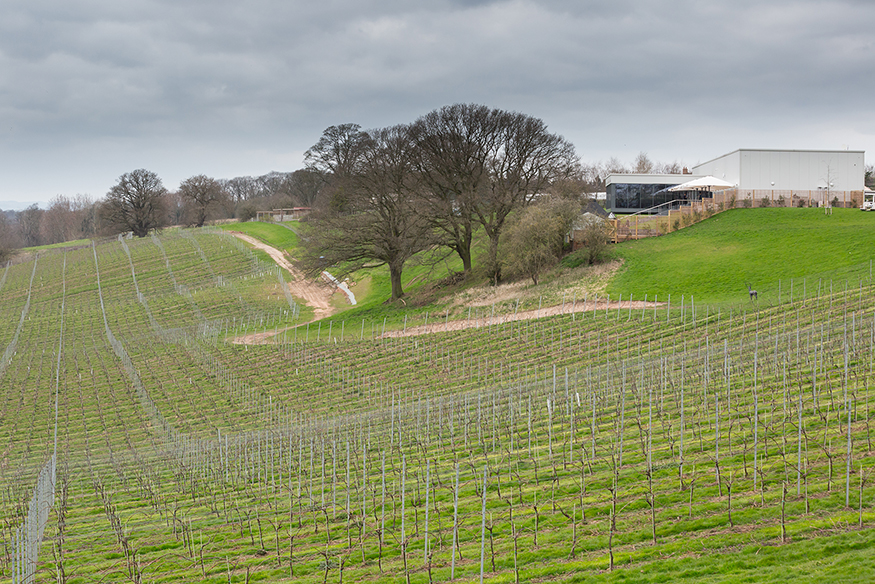The Domesday Book of 1086 lists Hencote, meaning a ‘high homestead’– but if the early inhabitants could have glimpsed the future, they would be astonished by the Hencote of 2021. Vineyard speaks to Mark and Andrew Stevens about the family’s mission to create an outstanding and unique luxury tourist destination, set in the stunning Shropshire countryside.
The vineyard first started as 200 vines in the Stevens’ family garden in 2009, planted by Dora Stevens a keen gardener. “It was just for fun. The grapes were made into wine, in demijohns, but it really wasn’t drinkable,” Mark laughed.
Mark’s father Andrew worked abroad for many years, but he kept noticing the rise in popularity of English sparkling wine and the positive press coverage of the fast-growing UK wine industry. So, on his return to the farm, he asked John Buchan, viticultural agronomist, to assess the land’s suitability for vines. “The soil and aspect were considered excellent, so we planted in 2015,” commented Mark.
Hencote is family run, by Andrew, Dora and their four adult children: Mark, Vivienne, Charles and Susanne – all with different roles within the business. Mark is involved with anything wine related and marketing. Charles looks after the finances and the accommodation. Vivienne runs the events and weddings, and Suzanne manages the restaurant. “Andrew oversees business strategy and is the final decision maker and Dora, will roll up her sleeves and help with anything and everything – and be an extra pair of hands when needed – in the vineyard, at harvest, or even at bottling,” explains Mark.
Mark initially started his career as a paralegal in the City of London, but he found that he would sit outside in the sun on his lunchbreak and not want to return inside to the office. “I wanted to be outside, so I decided to try working in the vineyard to see if I liked it.” Mark then attended the International Cool Climate Wine Symposium, hosted by the UK in Brighton in 2016. “I wasn’t even a wine drinker then, and the symposium was way over my head, but I was intrigued and so decided to study the foundation diploma in wine production at Plumpton College and also took the WSET level 2 exam. Despite his relative youth Mark is now running a successful business and has just become the father of twins.
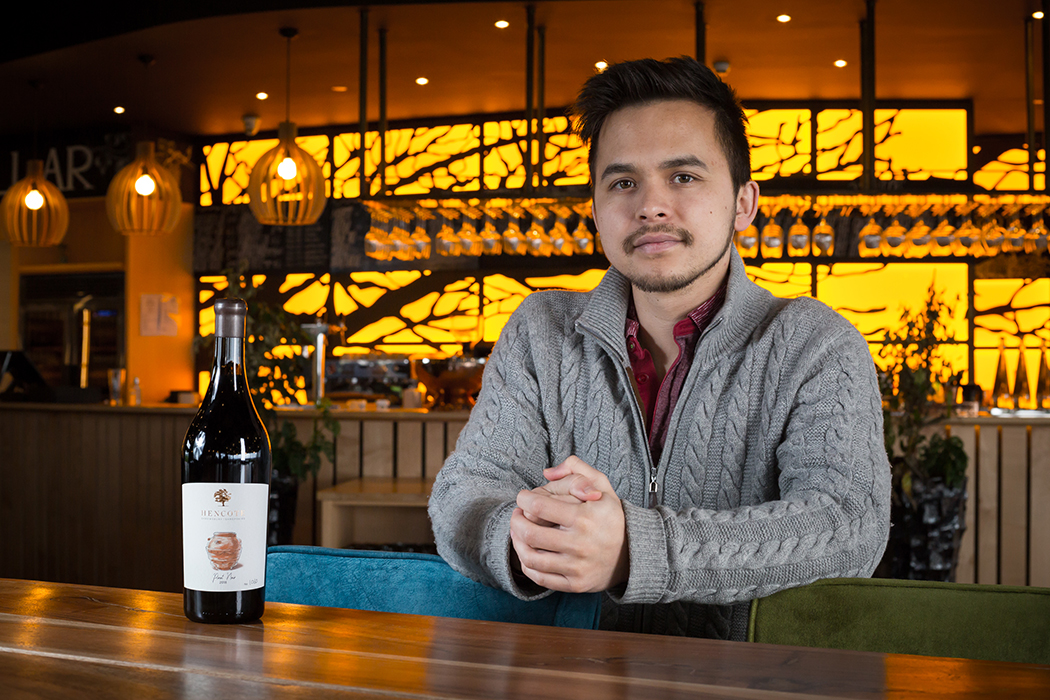
Mark Stevens ©Martin Apps, Countrywide Photographic
Tourism is key to the business
The Hencote business focus is solely sales direct to public, with no sales into either the trade or merchants. “We want people to come here and have a fantastic meal in the restaurant and stay in our luxury holiday home or the glamping lodges – this is our primary goal for selling our wine,” explained Andrew. To entice visitors, Hencote has an exquisite wine bar, an opulent lounge, a stunning glass-fronted restaurant called ‘The View at Hencote’ and the al fresco ‘Balcony at Hencote’, with panoramic views of the Welsh hills, Wrekin hill and the historic spires of the market town of Shrewsbury in the middle.
The Hencote logo is inspired by the beautiful 200-year-old white sycamore tree that is a prominent feature on the estate. “A local joiner has crafted many of the pieces of furniture for the restaurant from white sycamore. Our landscape was carved out by glaciers and the vineyard is over sandstone with glacial till, which is evident in the old course of the River Severn sitting below the vineyard,” explained Andrew. In keeping with the local natural resources some of this aggregate has been used to create the flooring in the restaurant, set in polished concrete. Best practice, low input and sustainability is a theme throughout. “Our wines are grown on site, made on site, consumed on site, what could be greener!” Andrew added.
“Our mission is to produce authentic, quality wine reflecting our location,” adds Mark. “We are not copying others or trying to produce certain styles just because they are popular, we aim to reflect where we are. To achieve this, we use minimum intervention and best practice in the vineyard and all the work is done by hand. We have the same philosophy in the winery, and our winemaker Gavin Patterson allows the wines to express their natural characteristics by avoiding intervention.
The visitor experience is key to the business and the team work hard at Hencote to create a seamless service for the discerning guest who is looking for a superb venue where they can celebrate, relax or indulge in a luxurious, romantic setting. The website is simple to navigate, and it is easy to book the restaurant, tours, tastings or accommodation. It is straight-forward to buy wine, gift vouchers, adopt a vine – or even plan a wedding in a breath-taking setting.
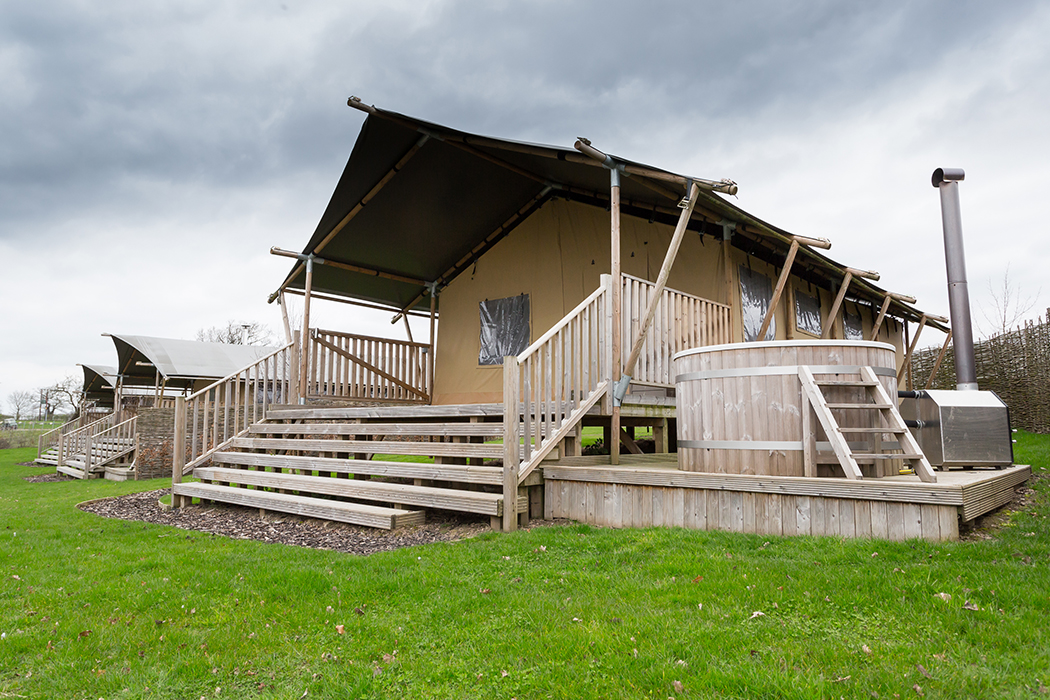
The vineyard and the wines
The vineyard sweeps down the hill in front of the restaurant and balcony. It is south facing and planted from 50m to 85m and covers 6.7 hectares. There are 23,000 vines, of which more than half are Pinot noir, along with Pinot meunier, Chardonnay, Seyval blanc, Solaris, Rondo and Pinot précoce. “In the vineyard we have burgundy clones of Pinot noir, so that we can produce still reds and rosés, as well as sparkling whites and rosés, depending on the fruit ripeness and the year. As the wines are sold to visitors or online a range of wine styles are made. Not everyone wants to drink sparkling, so we make still red, white and rosé – and with both premium and estate blends there is a wine for everyone,” explains Mark.
Hencote sought expert advice for establishing the vineyard. “John Buchan carried out the initial assessment of the land, including the soil analysis. He also helped us source the vines, and then Vine Works carried out the planting. Ian A’Court also provided some consultancy for a while before Gavin arrived as winemaker and viticulture director, and I finished the course at Plumpton College,” said Mark. “Gavin is assisted by Marco, who is from the prosecco region of Italy – but he has no plans to make a Charmat style wine.”
Originally from Zimbabwe, Hencote’s winemaker Gavin Patterson has worked in South Africa and many wine regions around the world. When visiting the UK with his own wine brand a few years ago, Gavin was impressed by the developing industry and was keen to get involved. Having British heritage, Gavin moved to the UK and joined Hencote in 2018 for the first harvest. “It was a fantastic first harvest and proved to me the huge potential of viticulture in the UK, in the right site,” said Gavin. Along with his experience as a winemaker, Gavin brought from South Africa five Tuscan clay amphorae. “I have worked a lot with oak barrels and really like the results of fermenting in a natural vessel, and I have found that the amphorae results are even better – and particularly suit the delicacy of English wine. Amphorae are used by biodynamic producers and I have now witnessed that the wine does change with the moon phases. The turbulence and movement will cause a clear, settled wine to become cloudy with its lees in a natural stirring process, and then will settle again. Its fascinating. The amphorae also allow some very gentle micro-oxygenation to take place.
“In 2018, which was a fantastic year, we fermented Pinot noir and Chardonnay in the amphorae. Both were spontaneous wild yeast fermentations and produced two fantastic wines. However, 2019 and 2020 did not provide us with the same conditions, and the wine fermented in the amphorae became excellent additions to our blends. As we want to avoid too much intervention or manipulation of the wines, we sometimes do not make certain styles in certain years.”
Hencote’s Amphora Pinot Noir 2018, released last year, was awarded a Gold Medal at the International Wine Challenge 2020, becoming the first red wine outside of Kent to be awarded a Gold at an international competition. The award is the crowning achievement of Hencote’s 2018 vintage which has now seen every wine released awarded a bronze or higher. “We were thrilled with the results and have had lots of lovely customer feedback on the website – hopefully tempting others to order,” said Mark.
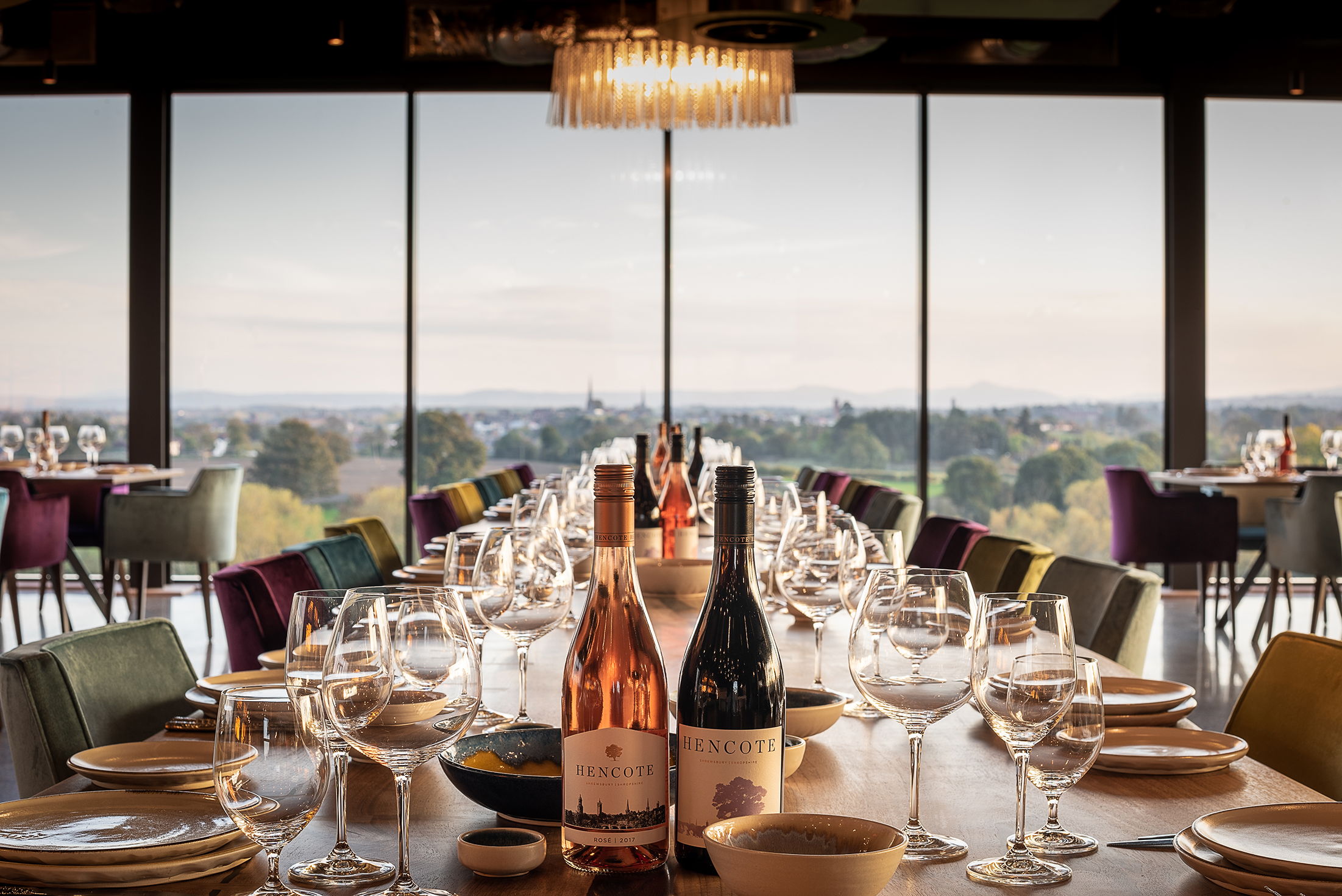
The impact of the pandemic
As a business that focussed on hospitality the pandemic has had a huge impact Mark explained: “All events, private parties and weddings were either cancelled or postponed. Fortunately, we launched our new online shop just before lockdown in March 2020 so we are actively developing our online sales and offering free local deliveries to our customers. We have a team of 25 people employed in the business, so sadly most of them have been furloughed, with just the vineyard and winery team able to work at the moment. But we are looking forward to having the whole team back, as soon as possible.”
The pandemic pushed many businesses to consider alternative activities and at Hencote Mark found that their virtual wine tours went really well. “They particularly suit corporate events, and this is something we will continue to offer after the pandemic.”
The Hencote website has a clear visual roadmap to re-opening and visitors will soon be able to make bookings for tours and tastings, the restaurant, accommodation and enquire about weddings. “We are cautiously optimistic for the summer and at least, this time, we are able to plan for re-opening. The first facility to open will be ‘The Balcony at Hencote’ as it is outdoors and set up for groups of six, then the glamping village with self-contained accommodation, and the wine tours and tastings. Our space is perfect for weddings and although this is a new addition to our business, and only just on the radar, there are lots of enquiries already.
“Hencote is proving to be a really sought-after special occasion and celebratory venue for birthdays and anniversaries, especially as the glamping village is the perfect place to stay over to avoid driving. ‘The View at Hencote’ has become a popular business breakfast conference destination as well as the go-to place for corporate canapés.”
The future
As Hencote sell all the production to visitors there are no plans to expand the vineyard. “Our first harvest was in 2018 and we produced 30,000 bottles and eight styles of wine. We are a young business, and the vines haven’t yet reached maturity, so it will be interesting to see how the varieties develop in different areas of the vineyard and our production increases.
“Like most vineyards we suffered in 2020 with the late frosts in May, but all being well, we hope for 40 tonnes this year. We used a Shur Farm’s cold air drain in the vineyard in May, but as it was an advective frost there was no warmer air to invert, so it was unable to work and sadly the temperature in the vines dropped to – 5°C in places. We are looking into better methods for frost mitigation. We are part of the NIAB EMR vineyard research consortium and are trialling a few rows with heated wires,” commented Mark.
